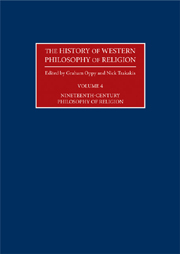Book contents
- Frontmatter
- Contents
- Editorial Introduction
- Contributors
- 1 Nineteenth-Century Philosophy of Religion: An Introduction
- 2 Johann Gottlieb Fichte
- 3 Friedrich Schleiermacher
- 4 G. W. F. Hegel
- 5 Friedrich Schelling
- 6 Arthur Schopenhauer
- 7 Auguste Comte
- 8 John Henry Newman
- 9 Ralph Waldo Emerson
- 10 Ludwig Feuerbach
- 11 John Stuart Mill
- 12 Charles Darwin
- 13 Søren Kierkegaard
- 14 Karl Marx and Friedrich Engels
- 15 Wilhelm Dilthey
- 16 Edward Caird
- 17 Charles S. Peirce
- 18 Friedrich Nietzsche
- 19 Josiah Royce
- 20 Sigmund Freud
- 21 Émile Durkheim
- Chronology
- Bibliography
- Index
16 - Edward Caird
- Frontmatter
- Contents
- Editorial Introduction
- Contributors
- 1 Nineteenth-Century Philosophy of Religion: An Introduction
- 2 Johann Gottlieb Fichte
- 3 Friedrich Schleiermacher
- 4 G. W. F. Hegel
- 5 Friedrich Schelling
- 6 Arthur Schopenhauer
- 7 Auguste Comte
- 8 John Henry Newman
- 9 Ralph Waldo Emerson
- 10 Ludwig Feuerbach
- 11 John Stuart Mill
- 12 Charles Darwin
- 13 Søren Kierkegaard
- 14 Karl Marx and Friedrich Engels
- 15 Wilhelm Dilthey
- 16 Edward Caird
- 17 Charles S. Peirce
- 18 Friedrich Nietzsche
- 19 Josiah Royce
- 20 Sigmund Freud
- 21 Émile Durkheim
- Chronology
- Bibliography
- Index
Summary
Edward Caird (1835–1908) was a leading member of the British idealist movement, which flourished from the 1870s until the mid–1920s. Together with Thomas Hill Green, Caird led the mid-Victorian reaction in Britain against the empiricism of John Locke, George Berkeley and David Hume (see Vol. 3, Chs 12, 14, 19), the associationism of John Stuart Mill, and the crude sensationalism of Herbert Spencer (e.g. Caird 2006). He was born in Greenock, Scotland on 23 March 1835, and, after his father John's death in 1838, he was raised by his aunt Jane Caird, herself a devout and active member of the Free Kirk (Jones & Muirhead 1921). He went up to the University of Glasgow in 1855, but ill health forced him extend his time as an undergraduate and to study for a while at the University of St Andrews. He gained a Snell Exhibition in 1860, which enabled him to complete his education at Balliol College, Oxford. His tutors included Benjamin Jowett and he became lifelong friends with Green during this time. Caird graduated in 1863, with a double first. After working as a private tutor and then serving as a Fellow of Merton College, Oxford for two years from May 1864, he took up the prestigious position of Professor of Moral Philosophy at the University of Glasgow. He made his professional name during the next twenty-three years at Glasgow, particularly for his work on Immanuel Kant. In November 1893 he became Master of Balliol College, Oxford, following the death of Jowett, a position that he held until March 1907. Having already suffered a paralytic stroke in 1905, he died in Oxford from Bright’s Disease, on 1 November 1908.
- Type
- Chapter
- Information
- The History of Western Philosophy of Religion , pp. 209 - 220Publisher: Acumen PublishingPrint publication year: 2009
- 1
- Cited by

